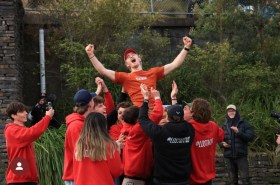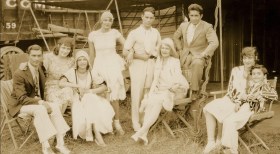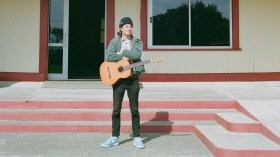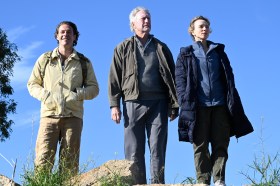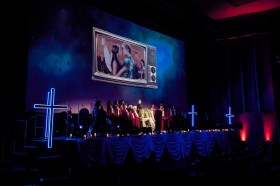This year in Australian cinema has offered an embarrassment of riches, making it particularly hard to whittle this list down to ten, but we’re pretty happy with how it’s turned out. Let us know if you agree or if your fave is missing?
Blaze
Archibald Prize-winning artist Del Kathryn Barton brings her vision alive in this devastatingly powerful directorial debut.
Centred on an incredible performance by Julia Savage as a young woman who witnesses a terrible sexual assault (Yael Stone and Josh Lawson in as harrowing a scene as you’ll see all year), the film focuses on the aftermath and how it affects the eponymous Blaze.
Barton’s emotionally confronting but ultimately mesmeric movie stitches puppetry and animation into live action. Drawing deep on her lived experience, Barton offers a profound gift to Australia that affirms we are not defined by our abusers.
You Won’t Be Alone
It was a cracking year for Australian horror, including the wrongtown hilarity of Insta influencer slasher Sissy. But it was fast-rising star Goran Stolevski’s genre-imploding dark fairy tale of shapeshifting witches that cast the most bedevilling spell.
The gifted Macedonian-Australian director’s startling debut somehow manages to combine bloody murder, cat killing and copious gore with a genuinely affecting coming-of-age vibe. It’s also an exhilaratingly genderqueer exploration of emerging identity that’s astoundingly beautiful and a masterpiece of storytelling magic.
Also catch his Melbourne International Film Festival (MIFF) opener and lovelorn whirlwind of a follow-up, Of an Age, when it gets a general release.
Read: Of An Age film is a tender and romantic Melburnian treat
The Drover’s Wife: The Legend of Molly Johnson
A powerhouse in Australia’s cultural landscape, Goa-Gunggari-Wakka Wakka Murri woman Leah Purcell works across multiple disciplines. Indeed, this is her third exploration of the old Henry Lawson short story that captivated her as a kid, but through a First Nations-focused and feminist lens.
First there was the stageplay she wrote and starred in at Sydney’s Belvoir Theatre in 2016. Then there was the 2019 novel she wrote to explore further what makes Molly tick. This year she stepped into her shoes again, starring in this brilliant big-screen adaptation which she also wrote and directed.
An incendiary reckoning with colonial and patriarchal violence.
Read: The Drover’s Wife review: a terrific Outback Western
The Stranger
Joel Edgerton is basically a sub-genre of Australian crime noir all by himself, as turbo-boosted by his appearance Animal Kingdom. But while his doomed character in David Michôd’s masterpiece didn’t quite make it to the light side, his compelling turn in gifted writer/director Thomas M. Wright’s AACTA-winning sophomore feature flips the picture.
This time he’s an undercover cop tasked with extracting a confession from Sean Harris’ creepily skeevy child murderer, under the pretence of offering him an escape route via a new identity. A compelling cat and mouse hunt, the dark game Edgerton’s lawman finds himself dancing through might just take him down too.
Read: The Stranger, Netflix review: a waking nightmare with heart
Moja Vesna
Some films fold you slowly but surely into their soulful embrace. That’s the case with Slovenian-Australian writer-director Sara Kern’s sublime feature debut. Building out her garlanded short Vesna Goodbye, it casts remarkable young actor Loti Kovacic as a ten-year-old valiantly attempting to hold her family together pretty much singlehandedly after the untimely death of her mother.
That includes sourcing baby clothes for her chain-smoking and heavily pregnant older sister (Mackenzie Mazur, also excellent) while their bumbling father (Slovenian actor Gregor Bakovic) offers little support. Throw in a brilliant turn from national living treasure Claudia Karvan and it leaves an indelible mark on your heart.
We Are Still Here
Opening this year’s Sydney Film Festival, this powerful anthology brings together an impressive array of First Nations filmmakers to spin stories that span centuries, from pre-invasion to imagined far-flung futures.
Screen Australia’s teamed up with the New Zealand Film Commission on this one, and the results are fantastic. Highlights include Samoan filmmaker Chantelle Burgoyne’s Mad Max-style dystopia, and Luritja/Warumumgu woman Danielle MacLean’s bracing animation depicting the nightmarish arrival of the British colonisers.
But it’s Beck Cole’s luminous Grog Shop, featuring Clarence Ryan (Cleverman) as a tradie trying to pluck up the courage to ask a bottle-o attendant on a date while fending off the unwanted attentions of a cop that steals it.
The Lonely Spirits Variety Hour
Playing at Perth’s Revelation festival and MIFF, this oddball gem opens as adorably absurd comedy in the vein of Spike Milligan and Jacques Tati, then hijacks your heart and leaves it broken in a million pieces before you know it.
Joining The Drover’s Wife on this list as rare examples of theatre that make the shift to the big screen with apparent ease, Nitin Vengurlekar adapts his solo show of the same name alongside co-writer and director Platon Theodoris. Vengurlekar once more plays the lead role of a silken-voiced garage radio host as a procession of guests swing by his teeny studio, including a blooming lovely Sabrina Chan D’Angelo.
It’s dreamy, but brace yourself for a heart-wrenching twist.
Elvis
A bravura return to form from the country’s most extra filmmaker, Baz Luhrmann’s full-throttle biopic of the King is almost entirely devoid of silence, mainlining the greatest hits fused surprisingly delicately with contemporary tracks.
It lives and breathes the indelible starlight of its subject, impeccably captured by an astounding Austin Butler. Sweeping the AACTAs, it’s a rollercoaster ride through a life less ordinary that even an inexplicably turdsome turn by Tom Hanks can’t sink.
As ever, half its magnificence is down to Luhrmann’s partner in life and cinema, Catherine Martin, and her unrivalled creative vision. Just try not to tap your toes.
Read: Elvis by Baz Luhrmann review: it’s one for the money
You Can Go Now
Premiering at the Adelaide Film Festival, this barnstormer of a documentary directed by Larissa Behrendt captures the mischievous energy and button-pushing humour of one of the country’s most rabble-rousing artists in Kamilaroi, Kooma, Jiman and Gurang Gurang man Richard Bell.
Coming off the back of an awesome retrospective of the same name at Sydney’s MCA gallery last year, the film traces his proud activist lineage and wide-ranging inspirations. They include the Aboriginal Tent Embassy in Canberra and the American Civil Rights movement, particularly the Black Panthers.
Never afraid of rattling folks’ cages and igniting dialogue, he’s great company in a firecracker of a doco that will make you mad at how far we still have to go.
The Lost City of Melbourne
It would be remiss of us to overlook this haunting elegy to the majesty of Australian cinemas no longer with us. The Victorian capital was an early champion of culture, with architecturally impressive picture houses popping up all over the city, including the space-age beauty of Sydney Road’s Padua Theatre RIP.
A labour of love, director Gus Berger crafted this tribute to filmic temples lost to oblivion – AKA mostly Whelan The Wrecker demolition company – while his own palaces, the Thornbury Picture House and Blow Up Cinema, were closed during lockdowns. Painstakingly put together with heaps of sumptuous archival footage summoned from the National Film and Sound Archives, it’s both a heartbreaking tribute to what was lost and also saved, like the Yarraville Sun and the ornate Regent Theatre (even if it’s no longer a cinema).


